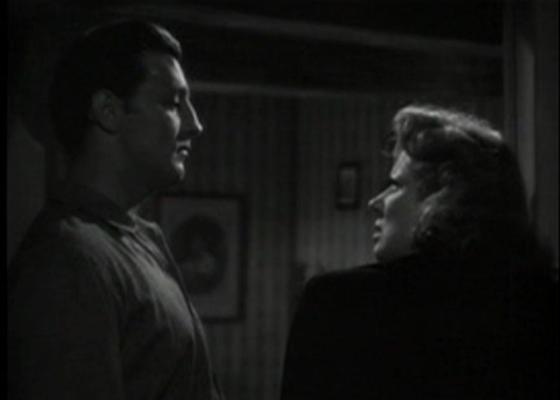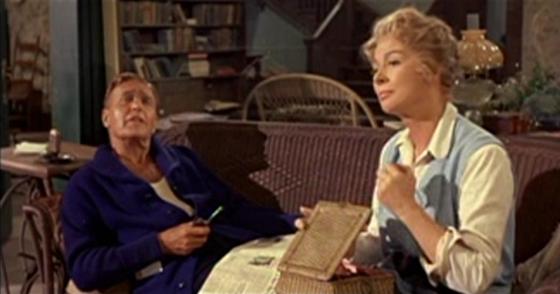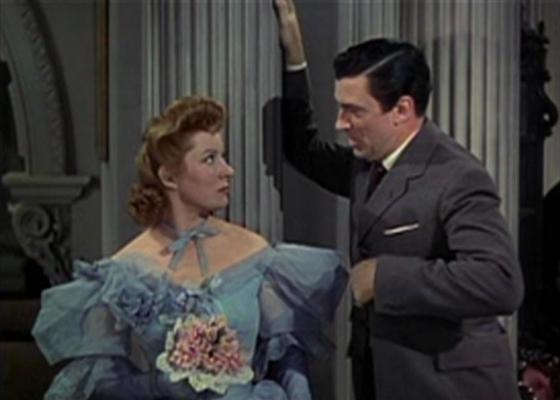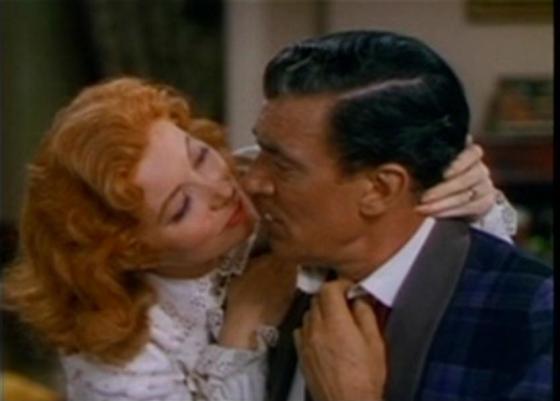Quick Facts
- Born: September 29, 1904, London, England
- Died: April 6, 1996, Dallas, Texas
- 1943 Academy Award winner, Best Actress in a Leading Role for Mrs. Miniver (1942)
- Academy Award nominated for that same award, Best Actress in a Leading Role, an additional six times including five straight years, 1942-1946
- Won Golden Globe for Best Motion Picture Actress – Drama for Sunrise at Campobello (1960)
- Named Photoplay’s Most Popular Female Star in 1944 and 1945
- Garson received her Star on the Hollywood Walk of Fame in 1960
- Recommended Reading: A Rose for Mrs. Miniver: The Life of Greer Garson
by Michael Troyan
Meeting Greer Garson
High in the mountains Charles Chipping (Robert Donat) heroically presses forward hoping he is able to rescue the unknown woman from out of the blinding mist. “Hello,” she says, calmly, her deep silky voice parting the fog for the normally withdrawn Chipping, whose rescue effort has been reversed. The shy, reserved instructor of boys is immediately awestruck by a vision that melts his heart from the moment she waves to him. The evolution to Mr. Chips has begun.
Greer Garson is immediately a star, yet who could know how great a star she would remain throughout the coming decade and beyond.
I became hooked on Garson the same moment Robert Donat’s Mr. Chips did, though it was several decades later for me.
TCM Star of the Month
Over the next four Monday evenings, beginning March 4, Turner Classic Movies will be playing 23 different movies featuring the unique talents of Greer Garson, including all eight (plus one) of her pairings with favorite co-star Walter Pidgeon.
The seven time Academy Award nominated actress enjoyed an unprecedented run of popular and critical success during the first half of the 1940s when she was nominated six times over a seven year period including five years in a row from 1942 through 1946.
Of those seven nominations her only victory was for Mrs. Miniver, but despite the breadth of her ‘40s run Greer Garson didn’t even receive a nomination for what many, including myself, believe was her best movie: Random Harvest.
It was eligible the same year that Garson was nominated for Mrs. Miniver.
Greer Garson Oscar Nominations:
Win in bold text.
- 1940: Goodbye, Mr. Chips (1939)
- 1942: Blossoms in the Dust (1941)
- 1943: Mrs. Miniver (1942)
- 1944: Madame Curie (1943)
- 1945: Mrs. Parkington (1944)
- 1946: The Valley of Decision (1945)
- 1961: Sunrise at Campobello (1960)
TCM Choices
Recommended titles that I am familiar with being shown by TCM this month are:
 Garson reprises the Ann Harding role of the wife in the 1941 remake of Where Ladies Meet starring Joan Crawford and Robert Taylor with Herbert Marshall as the husband. Crawford is the woman to come between Garson and Marshall. Taylor, in love with Crawford’s character, arranges for them all to come together in the same room.
Garson reprises the Ann Harding role of the wife in the 1941 remake of Where Ladies Meet starring Joan Crawford and Robert Taylor with Herbert Marshall as the husband. Crawford is the woman to come between Garson and Marshall. Taylor, in love with Crawford’s character, arranges for them all to come together in the same room.
Garson playing Elizabeth Bennet opposite Laurence Olivier’s Mr. Darcy in MGM’s 1940 adaptation of Jane Austen’s Pride and Prejudice.
Garson retaining her dignity (to some degree) opposite a Clark Gable so boisterous he seems better labeled Clark Gable Squared in 1945’s Adventure. Also featuring Joan Blondell as Garson’s best friend and Thomas Mitchell as Gable’s pal who’s lost his soul.
Airing that same morning Garson is set around the 19th Century steel mills of Pittsburgh to play love interest to Gregory Peck in The Valley of Decision (1945). Lionel Barrymore plays Garson’s father, a matter complicating any potential relationship with the Peck character.
In Desire Me (1947) Garson plays a woman whose husband (Robert Mitchum) has been presumably killed during the war, at least according to a stranger (Richard Hart) who fell in love with Garson from the stories her husband had told to pass the time in a war prison camp.
Years after her sultry roles of the 1940s Garson completely breaks type on her way to her final Oscar nomination in the part of Eleanor Roosevelt in 1960’s Sunrise at Campobello opposite Ralph Bellamy’s polio stricken FDR.
And then there are the Pidgeon pairings.
Greer Garson and Walter Pidgeon Movies:
- Blossoms in the Dust (1941, color)
- Mrs. Miniver (1942)
- Madame Curie (1943)
- The Youngest Profession (1943, as themselves)
- Mrs. Parkington (1944)
- Julia Misbehaves (1948)
- That Forsyte Woman (1949, color)
- The Miniver Story (1950)
- Scandal at Scourie (1953, color)
Greer Garson and Walter Pidgeon
Garson gains her second Oscar nomination, and first of five consecutive, playing real-life children’s rights advocate Edna Gladney in 1941’s Blossoms in the Dust. This is the first of eight dramatic pairings with Walter Pidgeon, who plays her husband.
The Garson-Pidgeon team was cemented the following year with 1942’s Mrs. Miniver, the war-time classic which won the Academy Award not only for Garson, but for Best Picture too. A little more on this classic title to follow in the section on Random Harvest.
Greer plays the title role in 1943’s Madame Curie, in which her young Marie falls in love with Pidgeon’s Pierre Curie while working for him in the laboratory. A fantastic biopic from a period when the genre flourished.
Put an asterisk by 1943’s The Youngest Profession when discussing Garson-Pidgeon movies, as the pair are only in it briefly as themselves (though they do share the screen together) in this title focusing upon Virginia Weidler’s young movie fanatic.
Greer is made up to be in her eighties as Mrs. Parkington (1944), an enjoyable saga that flashes back to the Nineteenth Century to show her move from poor little hotel maid to wife of Pidgeon’s fabulously wealthy Major Parkington and the life that such a position brings her. Greer has a delightful little tic she displays when exasperated where she puffs air from one side of her mouth with enough force to blow her hair out of place.
1948’s Julia Misbehaves may be the most atypical of the Garson-Pidgeon pairings as Garson gets to play for laughs like never before while the couple begin the film as long separated rather than married or falling in love. Julia Misbehaves is the movie that shows what would happen if any of those Garson-Pidgeon love matches had failed. It also gives them a grown daughter played by Elizabeth Taylor.
The 1949 adaptation of John Galsworthy’s Forsyte Saga, That Forsyte Woman, is another oddity as Pidgeon is the only one of three main male characters that Greer Garson is not in love with. I’d had watched and written about this one long before familiarizing myself with either the original novel or the later classic television adaptation. If you’ve somehow avoided those better received versions of this story yourself then That Forsyte Woman is enjoyable enough. It also provides an especially strong performance from Errol Flynn who is presented completely out of typical character as Soames Forsyte. But chances are this one is going to be painful if you already know Eric Porter as Soames and Nyree Dawn Porter as Irene.
The Minivers return in a sequel whose end product is as depressing as its subject manner in 1950’s The Miniver Story. Nonetheless this rarely aired title is a must watch for fans of the original as it checks in on the Miniver family after the war is over to see how their lives have progressed. Besides Garson and Pidgeon, Reginald Owen and Henry Wilcoxon reprise their roles from the original.
1953’s Canada set Scandal at Scourie marks the final pairing of Greer Garson and Walter Pidgeon and while it is loaded with even more sugar and sentiment than their better known titles it remains more neglected than it deserves to be. When Greer’s Mrs. McChesney attaches herself to a Catholic orphan girl (Donna Corcoran) it spells trouble for Protestant husband and town leader played by Pidgeon, who doesn’t take to Corcoran quite as well as Greer does. Even in this final effort Garson and Pidgeon are still a force together. Fans of their teamings will enjoy Scandal at Scourie.
Random Harvest
Even with such a wide array of choices I am certainly not alone in declaring Random Harvest my favorite of Greer Garson’s movies. Unlike some of her movies with Pidgeon, Garson is cast opposite an actor who is remembered equally well for his part in this exceptional film.
In fact, Ronald Colman’s 1943 Oscar nomination came for Random Harvest, one of seven for that film. Garson was instead nominated for Mrs. Miniver, which far surpassed Random Harvest with a staggering twelve Academy Award nominations. Garson’s victory was of one of six total Oscars for Mrs. Miniver, including Best Picture, a category which also included Random Harvest among its ten total nominees. Colman lost out to James Cagney’s portrayal of George M. Cohan in the classic Yankee Doodle Dandy (1942) as Random Harvest as a whole came up empty at the Awards.
 While Greer’s tear-jerking role in Random Harvest did not have quite the immediate impact of the contemporary set wartime classic Mrs. Miniver, it has aged into the superior movie. And as the seven Oscar nominations attest, it wasn’t exactly overlooked back in its own day either. It is impossible to understand the immediate reaction to Mrs. Miniver without actually having lived through World War II and so it’s reputation, while still strong, cannot hope to match the reception it received when first released in 1942.
While Greer’s tear-jerking role in Random Harvest did not have quite the immediate impact of the contemporary set wartime classic Mrs. Miniver, it has aged into the superior movie. And as the seven Oscar nominations attest, it wasn’t exactly overlooked back in its own day either. It is impossible to understand the immediate reaction to Mrs. Miniver without actually having lived through World War II and so it’s reputation, while still strong, cannot hope to match the reception it received when first released in 1942.
Random Harvest, on the other hand, is timeless. It too connected with its time as so many films of the period did in telling a story which emerged out of the previous war.
Ronald Colman begins as the heartrending amnesiac John Smith, a lost puppy whose immediate hopes of regaining his identity are dashed in the opening scene of the movie when a couple who have come hoping to claim him as their son turn out not to have ever seen him before. Colman’s Smith, who suffered his calamity during his service in the Great War, can barely even speak as he edges out of the asylum gates and into the streets where the civilian throngs celebrate the news of peace.
The overwhelmed Smith slips into a tobacconist’s shop whose proprietor (Una O’Connor) immediately recognizes him as an escapee of the asylum. He freezes. And then there’s that voice again. Same one Donat had heard in Goodbye, Mr. Chips, which incidentally also began life as a James Hilton novel. Garson, as a local stage performer, advises Smith to leave because the shop owner is most definitely calling to report him.
Garson reattaches herself to Colman out in the streets and cannot bring herself to let him out of her sight from that point. Dubbing him “Smithy,” her Paula eases Colman out of his shell and has patience with him throughout a slow recovery during which they fall very much in love.
It is really impossible to discuss Random Harvest in very great detail beyond that point without depriving first time viewers of at least a few extremely rewarding moments. Suffice it to say that the broken Colman of the first half of the film emerges in such a way to leave Garson’s Paula just as damaged throughout much of the second half.
If I could point to one scene to highlight Garson’s best performance I would say look for an office setting in which Colman discusses his future and, most uncomfortably for Garson’s Paula, her past. Those who have seen the film already know why this moment is so harrowing for Garson’s character. Those who have not yet seen Random Harvest can recall this warning as they dab their eyes with tissue after it passes. The moment falls after a pair of twists that may leave you confused for a moment while the heartbreak emerges just as you’ve likely adjusted to any of that confusion or surprise.
Random Harvest airs on TCM Monday night, March 11 at 10:30 pm Eastern Time, just after Mrs. Miniver. I expect you’ll love them both but I imagine Random Harvest will stick with you the rest of your life.
The complete Greer Garson TCM Star of the Month schedule for March 2013 follows.
For more on Greer Garson please see my previous post Greer Garson, the Oscar Nominated Years.
Also, another plug for Michael Troyan’s 1999 biography A Rose for Mrs. Miniver: The Life of Greer Garson
–I highly recommended that one and thank you in advance if you make the purchase through my affiliate link.
For another perspective on TCM’s March 2013 Greer Garson Star of the Month tribute please see this post at Laura’s Miscellaneous Musings.
Greer Garson – TCM March 2013 Star of the Month Schedule
Monday, March 4-5, 2013
- 8:00 pm – Goodbye, Mr. Chips (1939) starring Robert Donat, Greer Garson, Paul Henreid, D: Sam Wood
- 10:00 pm – Remember? (1939) starring Robert Taylor, Greer Garson, Lew Ayres, D: Norman Z. McLeod
- 11:30 pm – When Ladies Meet (1941) starring Joan Crawford, Robert Taylor, Greer Garson, D: Robert Z. Leonard
- 1:30 am – Pride and Prejudice (1940) starring Greer Garson, Laurence Olivier, Edna May Oliver, D: Robert Z. Leonard
- 3:30 am – Blossoms in the Dust (1941) strring Greer Garson, Walter Pidgeon, Marsha Hunt, D: Mervyn LeRoy
- 5:15 am – The Youngest Profession (1943) starring Virginia Weidler, Jean Porter, Edward Arnold, D: Edward Buzzell
Monday, March 11-12, 2013
- 8:00 pm – Mrs. Miniver (1942) starring Greer Garson, Walter Pidgeon, Teresa Wright, D: William Wyler
- 10:30 pm – Random Harvest (1942) starring Greer Garson, Ronald Colman, Susan Peters, D: Mervyn LeRoy
- 12:45 am – Madame Curie starring Greer Garson, Walter Pidgeon, Van Johnson, D: Mervyn LeRoy
- 3:00 am – Mrs. Parkington (1944) starring Greer Garson, Walter Pidgeon, Agnes Moorehead, D: Tay Garnett
- 5:15 am – Adventure (1945) starring Clark Gable, Greer Garson, Joan Blondell, D: Victor Fleming
- 7:30 am – The Valley of Decision (1945) starring Greer Garson, Gregory Peck, Lionel Barrymore, D: Tay Garnett
Monday, March 18-19, 2013
- 8:00 pm – Desire Me (1947) starring Greer Garson, Robert Mitchum, Richard Hart, D: George Cukor
- 9:45 pm – Julia Misbehaves (1948) starring Greer Garson, Walter Pidgeon, Elizabeth Taylor, D: Jack Conway
- 11:30 pm – That Forsyte Woman (1949) starring Greer Garson, Errol Flynn, Robert Young, D: Compton Bennett
- 1:30 am – The Miniver Story (1950) starring Greer Garson, Walter Pidgeon, Cathy O’Donnell, D: H.C. Potter
- 3:30 am – The Law and the Lady (1951) starring Greer Garson, Michael Wilding, Fernando Lamas, D: Edwin H. Knopf
- 5:15 pm – Julius Caesar (1953) starring Marlon Brando, James Mason, John Gielgud, D: Joseph L. Mankiewicz
Monday, March 25-26, 2013
- 8:00 pm – Strange Lady in Town (1955) starring Greer Garson, Dana Andrews, Cameron Mitchell, D: Mervyn LeRoy
- 10:00 pm – Her Twelve Men (1954) starring Greer Garson, Robert Ryan, Richard Haydn, D: Robert Z. Leonard
- 11:45 pm – Scandal at Scourie (1953) starring Greer Garson, Walter Pidgeon, Agnes Moorehead, D: Jean Negulesco
- 1:30 am – Sunrise at Campobello (1960) starring Greer Garson, Ralph Bellamy, Hume Cronyn, D: Vincent J. Donebue
- 4:00 am – The Singing Nun (1966) starring Debbie Reynolds, Ricardo Montalban, Greer Garson, D: Henry Koster
[phpbaysidebar title=”Greer Garson on eBay” keywords=”Greer Garson” num=”5″ siteid=”1″ category=”45100″ sort=”EndTimeSoonest” minprice=”79″ maxprice=”699″ id=”2″]















Cliff, what a great selection of Greer Garson films – it makes me realise that I’ve seen very few of hers, even though she is an actress I really like. ‘Blossoms in the Dust’ was shown in the UK recently and I recorded it, so will get on and see that one soon.
Interested in your comments on ‘That Forsyte Woman’, which I liked despite seeing it soon after going through the box set of the magnificent old TV series. For me Garson is perfect as Irene, just as good as Nyree Dawn Porter in the series – and the vivid colour of the scenes where she and Soames first meet as she is playing the piano really stick in my mind. Errol Flynn is great cast against type here, as you say (I always tend to like him cast against type and it is a pity he didn’t get a chance to do more different roles – he’s fantastic as a failed sports reporter with a drink problem in ‘The Sisters’, made the same year as Robin Hood!) Just a shame that the story isn’t more true to the book.
I also like ‘Mrs Miniver’ a lot, but am not a fan of ‘Pride and Prejudice’ as I just don’t think turning Austen into a screwball comedy works and Edna May Oliver is dreadful as Lady Catherine de Bourgh – but Garson and Olivier are both worth watching. Anyway, this posting of yours is a great resource as usual and one I’ll be returning to as I catch up with more Garson!
Thanks for the comment Judy. I’ve fallen in love with the ’60s Forsyte Saga series, which I had never watched until after That Forsyte Woman. Purchased it soon after seening the Garson-Flynn movie and have watched it in whole three times since then. Now I can’t see much reason for watching the earlier movie unless you’re a big fan of Garson or Flynn which, gee, I am!
I think my greatest problem with the movie as I see it today is that the story involving the Bosinney character turned out to be one of my least favorite portions of the mini-series. Of course that tale is the entire focus of the film. Because of that it largely turns into an apples and oranges comparison for me.
When it comes to Garson I seem to go with the flow as far as the more general tastes–Random Harvest and Mrs. Miniver are my favorites with a few of the additional Pidgeon teamings coming in behind them. Especially Mrs. Parkington. I just watched that one again and liked it even better than I remembered. And then, oh yeah, I’m a big fan of Goodbye, Mr. Chips as well.
Shoot, I probably even liked Adventure more than I let on above because I am a Gable fan and got a kick of the super duper revved up version of himself that he put over in that one. What a jerk his character is there!
It’s the final two weeks of TCM’s Star of the Month schedule that I wind up most curious about. I need to fill in a lot of holes in the ’50s with Greer Garson, but that’s not unusual, I’m always light on the ’50s with my favorite stars tending to get wrapped up in their pre-War work.
Enjoy the movies and thanks again!
Cliff
Just a brief note from a big Garson fan…the year of death is incorrect. She died in 1996, not 1990. She was 91.
Yikes, a typo that survived way too long! Thanks for the catch, it’s been corrected.